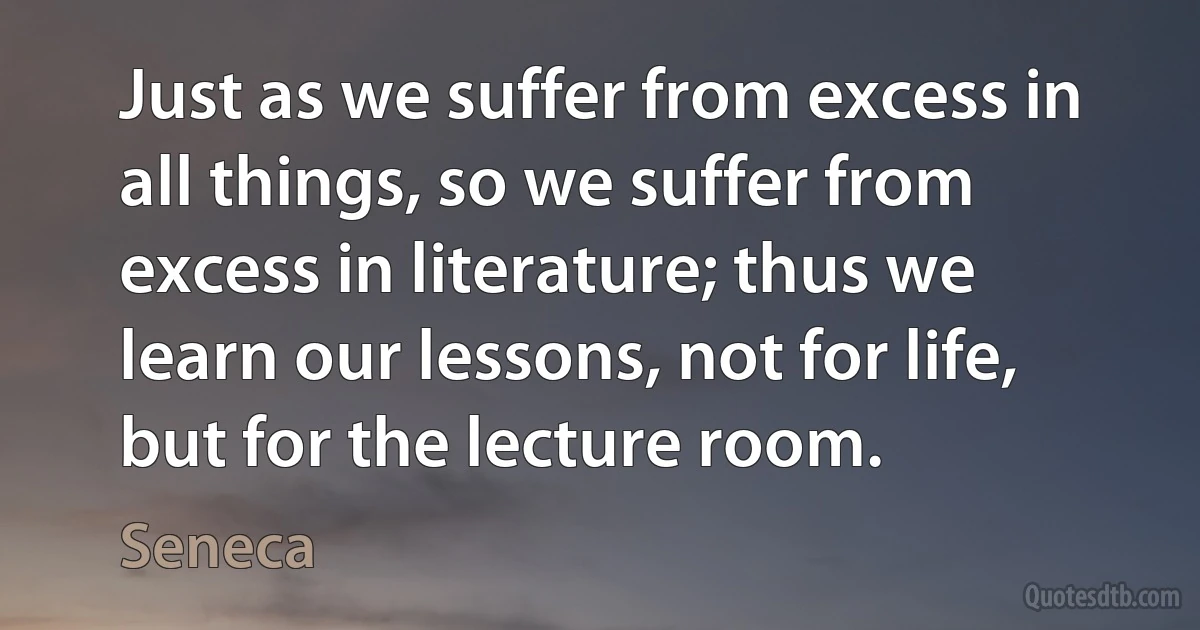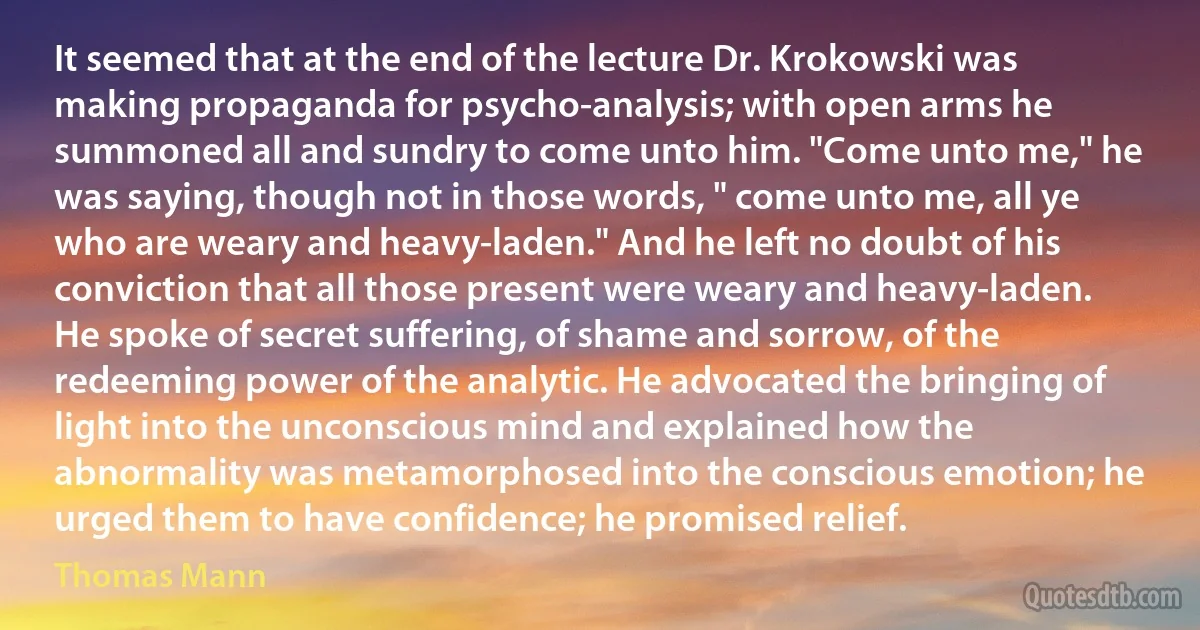Lecture Quotes - page 3
At Black Mountain College in 1952, I organized an event that involved the paintings of Bob Rauschenberg, the dancing of Merce Cunningham, films, slides, phonograph records, radios, the poetries of w:Charles Olson and M. C. Richards recited from the tops of ladders, and the pianism of David Tudor, together with my 'Juilliard lecture', which ends: 'A piece of string, a sunset, each acts.' The audience was seated in the center of all this activity. Later that summer, vacationing in New England, I visited America's first synagogue, to discover that the congregation was there seated precisely the way I had arranged the audience at Black Mountain.

John Cage
So it was that I gave about 1949 my 'Lecture on Nothing' at the Artists' Club on Eighth Street in New York City (started by Robert Motherwell), which predated the popular one associated with Philip Pavia, Bill de Kooning, et al. ). This 'Lecture on Nothing' was written in the same rhythmic structure I employed at the time in my musical compositions (Sonatas and Interludes, Three Dances, etc.). One of the structural divisions was the repetition, some fourteen times, of a single page in which occurred the refrain, 'If anyone is sleepy let him go to sleep.' Jeanne Reynal, I remember, stood up part way through, screamed, and then said, while I continued speaking, 'John, I dearly love you, but I can't bear another minute.' She then walked out. Later, during the question period, I gave one of six previously prepared answers regardless of the question asked. This was a reflection of my engagement in Zen.

John Cage
I had the greatest pleasure of listening to Gloria Estefan's lecture on "Life, Art and Spirituality" at the Graham Center of Florida International University today. It was a great experieince. She is such a wonderful, amazing woman, and a great inspiration. I believe that everyone who attended her lecture today was blown away by her sincerity, kind words and her sense of humor... yes, because even in the darkest days of her life, there was a little room for humor. She spoke of the power of prayer, and how different this world would be if we were to stop the violence, and the hating, and the wars between us.

Gloria Estefan
You too need the lecture on the childishness of coupling? Of course it's childish. Family life is, today more than ever, when the ethos is created substantially by the children. It's even worse when there are no children around. Because the childish adult replaces the child. Coupled life and family life bring out everything that's childish in everyone involved. Why do they have to sleep night after night in the same bed? Why must they be on the phone to each other five times a day? Why are they always with each other? The forced deference is certainly childish. The unnatural deference.

Philip Roth
Personally, I never met Knut Wicksell. I saw him once when he delivered a lecture in Oslo, but being an unassuming student at the time, I did not have the courage to talk to him. So my knowledge of his theory came only through his writings. That, however, was a very intense and absorbing form of making his acquaintance. Already from my early student days, I read his writings (in German and Swedish) avidly. And I continued to do so later.
When I started my study on Wicksell, I found that his works were not easy reading. Often it was only at the third or fourth reading that I grasped his ideas. Invariably, each new reading made me more and more enthusiastic. Sometimes it happened that I thought I had finally caught him in an inconsistency or in unclear thinking. Every time this happened, it turned out, however, that the error was mine.

Ragnar Frisch
[another part / version of Whistler's lecture:]
Nature contains the elements, in colour and form, of all pictures, as the keyboard contains the notes of all music. But the artist is born to pick, and choose, and group with science, these elements, that the result may be beautiful-as the musician gathers his notes, and forms his chords, until he bring forth from chaos glorious harmony. To say to the painter, that Nature is to be taken as she is, is to say to the player, that he may sit on the piano. That Nature is always right, is an assertion, artistically, as untrue, as it is one whose truth is universally taken for granted. Nature is very rarely right, to such an extent even, that it might almost be said that Nature is usually wrong: that is to say, the condition of things that shall bring about the perfection of harmony worthy a picture is rare, and not common at all.

James McNeill Whistler
... it's time for the opening lecture in Test Design 101: Consider: a woman claims to be a musician. You seat her at a piano and demand that she prove her claim. She cannot play the piano, and you conclude that her claim has been invalidated. Hardly. You see, the lady is a cellist....
You cannot challenge a claimant to do something they've never claimed they can do. That's why, at the JREF, we design a protocol only after the applicant has clearly stated (a) what they can do, (b) under what conditions, and (c) with what expected degree of success. And, the applicant must find the protocol appropriate, fair, agreeable, and adequate to prove their claim.

James Randi
If you stand up to people, they'll respect you for it. I had an e-mail from a Cambridge University American law student, and he said, 'You are an evil f------ man,' so I called him up - he put his telephone number on it - and I said, 'I'm going to call the police if I have any more messages like this from you. This is an abusive, threatening letter.' And he invited me to give a lecture. I couldn't do it, but I would have done it if I'd had the time.

Robert Fisk
Star Wars is adolescent nonsense; Close Encounters is obscurantist drivel; Star Trek can turn your brains to purée of bat guano; and the greatest science fiction series of all time is Doctor Who! And I'll take you all on, one-by-one or all in a bunch to back it up!"
Auditorium monitors moved in, truncheons ready to club down anyone foolish enough to try jumping the lecture platform; and finally there was relative silence. And I heard scattered voices screaming from the back of the room, "Who? And I said, "Yes. Who!

Harlan Ellison
Shouldness is being flouted here,” said Launcelot. "Shouldness is perhaps self-explanatory, but I have never seen it adequately dealt with, either in print or in the lecture hall. When that huntress got me in the bum with an arrow, it was an offense to shouldness. It shouldn't have gone that way. I told the story to Sir Roger, and now he never tires of telling it, tells it to everyone who comes down the pike. That a knight of the Round Table could be pierced in that way by a female has a significance quite apart from the ludicrous. It's in the realm of those things which should not happen-a category which holds much philosophical interest, as anyone who has ever looked into anomaletics will recognize. The insult to my dignity was not nearly so grave as the insult to shouldness.

Donald Barthelme
You know, the most amazing thing happened to me tonight. I was coming here, on the way to the lecture, and I came in through the parking lot. And you won't believe what happened. I saw a car with the license plate ARW 357. Can you imagine? Of all the millions of license plates in the state, what was the chance that I would see that particular one tonight? Amazing!

Richard Feynman
President Clinton has made a few feeble swipes at addressing this issue [school violence], but one can only gape at the unintentionally comic spectacle of this man chastising the gun-lobby and America's love of violent movies while he rains bombs on Yugoslavia, where at least twenty noncombatants have already died for every innocent student at Columbine High. It is like listening to a man with a crack-pipe in his hand lecture children about the evils of drugs.

Stephen King



